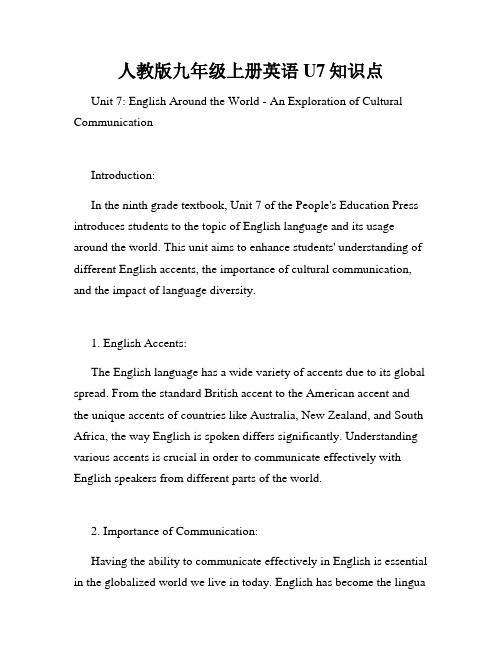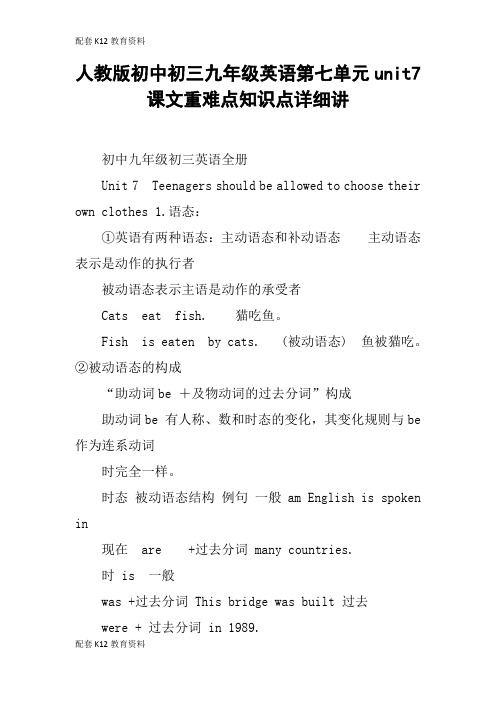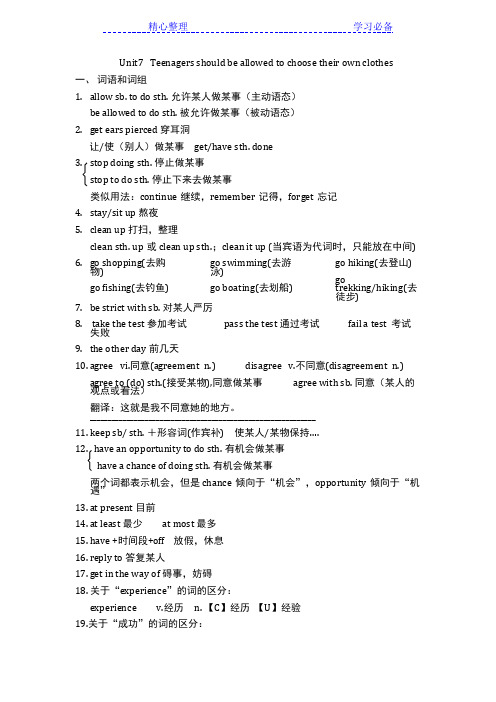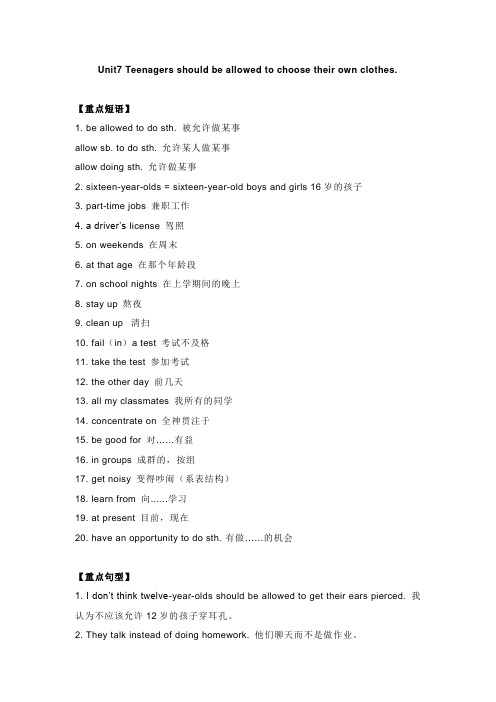最新人教版九年级英语第七单元知识点归纳
人教版九年级上册英语U7知识点

人教版九年级上册英语U7知识点Unit 7: English Around the World - An Exploration of Cultural CommunicationIntroduction:In the ninth grade textbook, Unit 7 of the People's Education Press introduces students to the topic of English language and its usage around the world. This unit aims to enhance students' understanding of different English accents, the importance of cultural communication, and the impact of language diversity.1. English Accents:The English language has a wide variety of accents due to its global spread. From the standard British accent to the American accent and the unique accents of countries like Australia, New Zealand, and South Africa, the way English is spoken differs significantly. Understanding various accents is crucial in order to communicate effectively with English speakers from different parts of the world.2. Importance of Communication:Having the ability to communicate effectively in English is essential in the globalized world we live in today. English has become the linguafranca of international business, politics, and communication. The unit emphasizes the importance of clear and appropriate communication in English to avoid misunderstandings and build relationships with people from different cultural backgrounds.3. Language Diversity:Unit 7 also highlights the diversity of the English language itself. English has evolved over time and has been influenced by a variety of other languages. Students are introduced to loanwords, idioms, and expressions that have been adopted from various cultures. This helps students understand the concept of linguistic diversity and how it enriches the English language.4. Cultural Awareness:Cultural awareness is a key aspect of language learning. Unit 7 encourages students to appreciate cultural differences and avoid making assumptions based on language variations. Through exposure to different accents and cultural practices associated with English-speaking countries, students are encouraged to embrace cultural diversity and become more globally-minded individuals.5. Language Challenges and Strategies:Unit 7 also addresses the challenges that learners may face while studying English. The unit provides strategies and techniques to overcome these challenges, such as listening to podcasts, watching movies, and engaging in conversations with native English speakers. These practical tips empower students to improve their English skills and develop confidence in their abilities.Conclusion:Unit 7 of the ninth-grade English textbook provides students with a comprehensive understanding of the English language's global significance. By exploring accents, cultural communication, language diversity, and challenges faced by learners, the unit aims to equip students with the necessary skills to navigate the globalized world with confidence. Emphasizing the importance of effective communication and cultural awareness, Unit 7 encourages students to become global citizens who appreciate and celebrate linguistic and cultural diversity.。
【配套K12】人教版初中初三九年级英语第七单元unit7课文重难点知识点详细讲

人教版初中初三九年级英语第七单元unit7课文重难点知识点详细讲初中九年级初三英语全册Unit 7 Teenagers should be allowed to choose their own clothes 1.语态:①英语有两种语态:主动语态和补动语态主动语态表示是动作的执行者被动语态表示主语是动作的承受者Cats eat fish. 猫吃鱼。
Fish is eaten by cats. (被动语态) 鱼被猫吃。
②被动语态的构成“助动词be +及物动词的过去分词”构成助动词be 有人称、数和时态的变化,其变化规则与be 作为连系动词时完全一样。
时态被动语态结构例句一般am English is spoken in现在 are +过去分词 many countries.时 is 一般was +过去分词 This bridge was built 过去were + 过去分词 in 1989.时can/should 情态 may +be+The work must be 动词过去分词 done right now. must/…③被动语态的用法当我们不知道谁是动作的执行者,或者没有必要指出谁是动作的执行者,或者只需强调动作的承受者时,要用被动语态。
2. allow sb. to do sth. 允许某人做某事如:Mother allows me to watch TV every night. 妈妈允许我每晚看电视。
be allowed to do sth. 被允许做某事如: Lily is allowed to go to Qinzhou. 莉莉被允许去钦州。
3. get their ears pierced 穿耳洞让/使做某事 get sth. done (过去分词) have sth. done (过去分词)如:I get my car mended. = I have my car mended. 我让别人修好我的车初中九年级初三英语全册初中九年级初三英语全册4. enough 足够形容词+enough 如:beautiful enough 足够漂亮enough+名词如:enough food 足够食物enough to 足够…去做…如:I have enough money to go to Beijing. 我有足够的钱去北京。
人教版英语九年级Unit 7知识点总结

九年级Unit 7 Teenagers should be allowed to choose their own clothes. 讲义一、词性转换Section A1. safety→ (adj.) safe2. part-time → (反义词.) full-time3. badly → (adj.) bad4. educate → (n.) education5. manage → (n.) management Section B6. enter → (n.) entrance7. choice → (v.) choose二、短语归纳1. be worried about 为…担心2. have part-time jobs做兼职工作3. get one’s ears pierced打耳洞4. be excited about对…感到兴奋5. take lots of photos拍许多照片6. by my side在我身边7. through the field穿过田间8. make sure确信9. keep…from…使…避开…10. give sb. a hug给某人一个拥抱11. talk back顶嘴12. listen to sb.听某人说13. agree with sb.赞同某人14. learn…from…向…学习…15. keep…away from…使…避免接近…;使…远离…16. make one’s own decisions 自己做决定17. manage one’s own life应付自己的生活18. be strict with sb. 对某人要求严格19. get in the way of挡…的路;妨碍20. achieve one’s dreams实现某人的梦想21. how much多么22. end up结束23. be serious about认真对待…24. care about关心25. make this choice做出这个选择26. in the end最后27. keep off关闭1. be allowed to do sth. 被允许做某事2. stop doing sth. 停止做某事3. get sth. done使某事被做4. should do sth. 应该做某事5. what to do做什么6. need to do sth. 需要做某事7. spend time with sb. 与某人共度时光8. be excited about doing sth.对做某事感到兴奋9. hurt oneself伤到自己10. give sth. to sb.把某物给某人11. regret doing sth. 懊悔做某事12. allow sb. to do sth. 允许某人做某事13. practice ding sth. 练习做某事14. take care of oneself照顾自己15. start doing sth. 开始做某事16. continue to do sth. 继续做某事17. see sb. do sth. 看见某人做过某事18. love doing sth. 喜欢做某事19. have nothing against doing sth.不反对做某事20. have a chance to do sth. 有机会做某事21. spend more time on sth. 在某事上花费更多时间三.重点句子1. I don’t think sixteen-year-olds should be allowed to drive. 我认为不应该允许16虽的青少年开车。
人教版九年级英语第七单元重点短语及句型知识点小结

人教版九年级英语第七单元重点短语及句型知识点小结Unit 7 Teenagers should be allowed to choose their own clothes.一.重点短语1. choose their own clothes选择自己的衣服2. be serious about对…认真,严肃3. care about担心4. eight hours’ sleep八小时的睡眠5. driver’s/driving license驾照6. instead of doing sth代替做某事7. wear uniforms穿校服8. be good for对…有益be bad for对…有害9. a fifteen-year-old boy一个15岁的男孩10. talk back回嘴,顶嘴11. volunteer to do sth志愿做某事12. make my own decision 做自己的决定13. old people’s home养老院14. the importance of …的重要性15. make sure确保16. a professional runner一个专业的赛跑者17.keep…away from远离get in the way of挡…路;妨碍18. stay up 熬夜19. a part-time job兼职20. be strict with sb. 对某人严厉be strict in sth对某事严厉二.重点句型1.She is a sixteen-year-old girl.=She is sixteen years old.2. allow sb. to do sth. 允许某人做某事(主动语态)be allowed to do sth. 被允许做某事(被动语态)Mother allows me to watch TV every night.LiLy is allowed to go to America.3. get their ears pierced 穿耳洞让/使(别人)做某事get sth. done(过去分词)have sth. doneI get my hair cut. == I have my hair cut.4. enough 足够形容词+enough 如:beautiful enough足够漂亮enough+名词如:enough food 足够食物enough…to 足够…去做…例:I have enough money to go to Beijing. 我有足够的钱去北京。
人教版九年级英语Unit7知识点总结

第1 页共16 页人教版九年级英语Unit7《Teenagers should be allowed to choosetheirOWn clothes.》知识点【短语归纳】1.g et one ' S driver ' s/driving得e驾驶执照get/have one ear s PierCed 穿耳孑L get/have SOmething done某事被做2.no Way没门,不行by the Way 顺便一提in the Way 这样in a Way 在某种程度上on the/one ' S Wa在to∙路上ThiS way, PIeaSe请走这边。
in this Way 用这种方法go out of one ' S Way to d特S地不怕麻烦做某事get in the Way of妨碍…第1 页共16 页3.sixteen-year-olds (SiXteen-year-oldchildren) 十六岁的人第2页共16页4.be Worried about=worry about 担心be an xious about 焦虑be SeriOUS about对… 认真的be excited about对… 感到兴奋地be n ervous about对…感至U紧张be relaxed about对..感到放松的5.have part-time jobs 做兼职工作full-time job全职工作6.stop doi ng Sth停止做某事stop to do sth.停下来去做某事forget/remember to do forget/remember doing7.SPe nd time With sb.花时间和某人在一起SPe nd 金钱/时间on sth. SPe nt -SPe nt SPend 金钱/时间in doing sth.第2页共16页Pay金钱for sth. Paid-Paid第3 页共16 页sth. cost sb. 金钱cost-costIt takes sb. 时间to do sth. took-taken 8.take photos, take a Phot o 照相make mistakes=make a mistake 犯错e a flash 使用闪光灯flash cards 抽认卡10.a ll night 整夜all day整天all the students the whole cake11.s tay by my side 呆在我身边12.m ake Sure = be Sure确保,确定make sure to do be sure of/about 13.k eep sb. (away) from Sth使某人远离某物keep out 不让进入keep sb./sth.+adj.使… 保持keep sb. doing sth. 一直让某人做某事第3 页共16 页keep/stop/prevent sb. from doing 阻止某人做某事第4页共16页14.h urt On eself伤害某人自己15.g ive sb. a hug = hug sb.拥抱某人n. v.16.l ift sb. UP 举起某人lift电梯v. n.17.c ough badly 剧烈地咳嗽have a high feve 发高烧18.t alk back 回嘴19.a n adult 一个成人kid-kids ChiId-ChiIdre n20.think back to 回想起look back talk back come back go back get back 回头看顶嘴回来回去回来turn back give back bring back take back转身归还带回来带回去21.regret doi ng sth.后悔做了某事第4页共16页22.make one ' S own decis做某人自己的决定第5 页共16 页第5 页共16 页decide to do sth. = make a decision to do = make up one sth. s mind to do下定决心做某事23.too + adj.+ to do sth.太…而不能做某事So…that = SUCh …th⅛B此… 以至于not … enough toThe boy is too young to dress himself.The boy is not old enough to dress himself.The boy is so young that he can t dress himself.He is such a young boy that hecan24.Iearn …fron从…学至U…25.agree with sb 同意某人的观点disagree with sb. 不同意某人的观点agreement--- disagreementn.be in agreement 意见一致t dress himseIf. agree to do sth.disagree to do sth.26.move out 搬出去27.take (good)care of = Iook after(weII)=carefor 照顾第5 页共16 页28.manage One ' S OWn Ii管理自己的生活manage to do sth 努力完成某事try tO dO Sth. 努力做某事try one ' S best to de尽某人最大努力做某事29.that is Why那就是为什么…30.continue to do Sth 继续做某事31.take a tes参加考试PaSS the tesiS 过考试fail the test考试不及格faiI to do sth.succeed in doingsuccess n. succeed v. successful adj. successfully adv.32.be StriCt With sb. in Sth在某方面对某人要求严格33.a running Sta 一个跑步明星第7 页共16 页34.a PrOfeSSi OnalrunneL个专业的跑步运动员35.grow UP 长大grow-grew-grow nget/be older36.allow sb. to do Sth允许某人做某事be allowed to do sth.被允许做allow doing sth.允许做.should be allowed to do sth. 应该被允许去做某事37.have nothing against doing sth.We have nothing against running.38.end UP With以…结束end UP as最终成为at the end of at the beginning ofin the end=at last=finallyby the end of …39.practice doi ng Sth 练习做某事第8 页共16 页Practice/finish/enjoy/mind/sUggest/avoid/consider/stand/all owPay attention to, look forward to, concentrate on, give UP, PUt off第9 页共16 页第8 页共16 页注意盼望,向往集中注意力放弃推迟40.see sb. do sth. 看见某人做了某事see sb doing sth. 看见某人正在做某事hear/see/watch/notice sb. do sth. 变被动还原tohear/see/watch/notice sb. doing sthlet/make/have sb. do sth. 变被动还原to41.Care about St关心某人42.talk With sb. about Sth 和某人谈论某事talk back, have a talk, give a talk, talk show, talk to …顶嘴谈谈作报告脱口秀和..谈43.make a ChOiCe做选择ChooSe-ChoSe-ChoSe n44.have a chance to do sth.= have an opportunity to do sth.have a ChanCe of doing Sth.= have an opportunity of doing Sth.有机会去做某事45.On/at Weeke nds = on/at the Weeke n在周末第8 页共16 页46.at that age 在那个年龄段第8 页共16 页in One ' S twenti在某人20多岁的时候47.on school nights 在上学期间的每个晚上on school days48.Stay UP (SIeeP Iate熬夜oversleep (get UP late)49.clean UP (相当与及物动词)清扫Clean-up Day扫除日50.the other day=a few days ago前几天51.all my claSSmateS 我所有的同学52.COnCen trate on doing全神贯注于53.be good for 对…有益be bad for 对..有害be good/kind/friendly to 对.. 友好的be good at=do well in 擅长于..be good with 善于应对的54.in groUPS 成群的,按组55.get/be noiSy 吵闹(系表结构)make a noiSe 吵闹noiSe-noiSy-noiSily56.at PreSent 目前,现在第12 页共16 页【重点句子】57.I don 'tthink twelve-year-olds should be allowed to get their ears pierced. 我认为不应该允许12 岁的孩子穿耳孔。
人教版九年级英语UNIT7知识点总结

精心整理学习必备Unit7 Teenagers should be allowed to choose their own clothes一、词语和词组1.allow sb. to do sth. 允许某人做某事(主动语态)be allowed to do sth. 被允许做某事(被动语态)2.get ears pierced 穿耳洞让/使(别人)做某事get/have sth. done3.stop doing sth. 停止做某事stop to do sth. 停止下来去做某事类似用法:continue继续,remember记得,forget忘记4.stay/sit up 熬夜5.clean up 打扫,整理clean sth. up或 clean up sth.;clean it up (当宾语为代词时,只能放在中间)6.go shopping(去购物)go fishing(去钓鱼) go swimming(去游泳)go boating(去划船)go hiking(去登山)gotrekking/hiking(去徒步)7.be strict with sb. 对某人严厉8. take the test 参加考试 pass the test 通过考试 fail a test 考试失败9.the other day 前几天10.agree vi.同意(agreement n.) disagree v.不同意(disagreement n.)agree to (do) sth.(接受某物),同意做某事 agree with sb. 同意(某人的观点或看法)翻译:这就是我不同意她的地方。
_____________________________________________________________11.keep sb/ sth. +形容词(作宾补)使某人/某物保持….12. have an opportunity to do sth. 有机会做某事have a chance of doing sth. 有机会做某事两个词都表示机会,但是chance倾向于“机会”,opportunity倾向于“机遇”13.at present 目前14.at least 最少 at most 最多15.have +时间段+off 放假,休息16.reply to 答复某人17.get in the way of 碍事,妨碍18.关于“experience”的词的区分:experience v.经历 n. 【C】经历【U】经验19.关于“成功”的词的区分:success n. 成功,成就,胜利 succeed v.成功 successfully adv. 成功地successful adj.成功的do sth. successfully = succeed in doing sth.=manage to do sth.做成了某事19.think about 与think of 的区别①当两者译为:认为、想起、记着时,两者可互用例句:I often think about/ of that day. 我经常想起那天。
人教版英语九年级Unit7单元知识点归纳

Unit7 Teenagers should be allowed to choose their own clothes.【重点短语】1. be allowed to do sth. 被允许做某事allow sb. to do sth. 允许某人做某事allow doing sth. 允许做某事2. sixteen-year-olds = sixteen-year-old boys and girls 16岁的孩子3. part-time jobs 兼职工作4. a driver’s license 驾照5. on weekends 在周末6. at that age 在那个年龄段7. on school nights 在上学期间的晚上8. stay up 熬夜9. clean up 清扫10. fail(in)a test 考试不及格11. take the test 参加考试12. the other day 前几天13. all my classmates 我所有的同学14. concentrate on 全神贯注于15. be good for 对…...有益16. in groups 成群的,按组17. get noisy 变得吵闹(系表结构)18. learn from 向......学习19. at present 目前,现在20. have an opportunity to do sth. 有做……的机会【重点句型】1. I don’t think twelve-year-olds should be allowed to get their ears pierced. 我认为不应该允许12岁的孩子穿耳孔。
2. They talk instead of doing homework. 他们聊天而不是做作业。
3. He is allowed to stay up until 11:00 pm. 允许他们熬到晚上11点。
九年级人教版英语U7知识点

九年级人教版英语U7知识点Unit 7 of the ninth-grade People's Education Edition English textbook covers a range of essential language points and concepts. In this unit, students learn new vocabulary, grammar structures, and practice their reading and listening skills. Let's explore some of the key knowledge points covered in this unit.1. Vocabulary:Vocabulary is a fundamental aspect of language learning. In Unit 7, students encounter a variety of words and phrases related to the theme of "Great scientists." It is essential to understand and memorize these words to improve overall comprehension and communication skills.For example, words like "electron," "invent," "discover," and "technology" are introduced to help students describe scientific concepts and advancements. Learning these words and their meanings enables students to discuss scientific topics confidently.2. Grammar:Grammar is the backbone of any language. Unit 7 focuses on essential grammar rules and structures that help students effectively communicate in English. The unit includes the following grammar points:a) Present Simple Tense: Students learn to use this tense to talk about facts, routines, and habits. For instance, "Scientists use microscopes to study cells."b) Present Continuous Tense: This grammar structure is introduced to describe actions happening at the moment of speaking or temporarily. For example, "He is working on a new experiment."c) Comparatives and Superlatives: Students learn how to make comparisons using comparative and superlative forms, such as "Albert Einstein is more famous than Isaac Newton."d) Passive Voice: The unit discusses the passive voice, where the focus is on the action rather than the doer. For instance, "The theory was developed by a team of scientists."3. Reading Comprehension:Unit 7 includes various reading passages that expose students to different text types, such as biographies, articles, and interviews. These texts enhance students' reading comprehension skills and provide valuable context for vocabulary and grammar usage.The comprehension exercises at the end of each reading passage help students infer information, identify details, and understand the main ideas. By practicing these exercises, students develop critical thinking skills and improve their ability to extract relevant information from a text.4. Listening Skills:Listening skills are crucial for effective communication. Unit 7 incorporates audio materials with different accents and speech patterns. Students listen to conversations, interviews, and scientific explanations to improve their listening comprehension.Listening exercises challenge students to recognize specific information, understand the main ideas, and infer meaning from context. By practicing these exercises, students enhance their ability to understand spoken English in real-life situations.5. Speaking and Writing:Unit 7 also includes speaking and writing activities that promote communication and language production. Students engage in pair or group discussions, role-plays, and presentations, showcasing their understanding of the vocabulary and grammar structures learned.The writing exercises encourage students to express their opinions, describe scientific concepts, or summarize information from readings. These activities foster creativity, critical thinking, and effective written communication skills.In conclusion, Unit 7 of the ninth-grade People's Education Edition English textbook covers various language skills and knowledge points. By learning and practicing the vocabulary, grammar, reading, listening, speaking, and writing tasks in this unit, students can enhance their overall English language proficiency and develop crucial academic and communication skills.。
- 1、下载文档前请自行甄别文档内容的完整性,平台不提供额外的编辑、内容补充、找答案等附加服务。
- 2、"仅部分预览"的文档,不可在线预览部分如存在完整性等问题,可反馈申请退款(可完整预览的文档不适用该条件!)。
- 3、如文档侵犯您的权益,请联系客服反馈,我们会尽快为您处理(人工客服工作时间:9:00-18:30)。
Unit 7 Teenagers should be allowed to choose their own clothes一、必记单词①名词:license 证,证件safety安全,安全性field田野,场地poem诗,韵文community社区,社团chance机会,可能性society社会choice选择,挑选②动词:educate教育,训导manage完成(困难的事);应付(困难局面)enter 进来,进去③动词&名词:smoke吸烟,冒烟;烟cry哭,叫喊hug拥抱,搂抱lift举起,太高;电梯regret感到遗憾;懊悔,后悔support支持④形容词:tiny极小的,微小的awful很坏的,讨厌的⑤副词:badly严重地;差;非常;二、短语Have part-time jobs 做兼职工作get earshot pierced 扎耳洞Talk back回嘴,顶嘴keep...away from避免接近,远离Make one’s own decision自己做决定get in the way of挡...的路;妨碍Have nothing against 不反对be serious about认真对待三、小语法讲解:1.No way!不行!No way意为“不行”,这是英语口语中一个直接拒绝对方的表达用语,强调不能按照他人的要求去做某事或不允许别人做某事。
Can I borrow your bike?No way!2.I don’t think sixteen-year-olds should be allowed①宾语从句跟在think,believe,suppose,expect等动词后,当主句是一般现在时,且主句的主语是第一人称(I,We)时,变否定句时,要否定主句,而不是从句,我们称之为“否定前移”;变反意疑问句时,附加问句要与从句一致。
I think you are rightI don’t think you are rightI don’t think he is clever,is he?注意:如果主句的主语是第二,第三人称,变否定句时,要在从句否定;变反意疑问句时,附加句要与主句一致。
They think you are rightThey think you are not rightThey think you are right,don’t they?【拓展】think(认为)、suppose(猜想)、believe(相信)、expect(期待)练习:I don’t think she will agree with us,_______?A.will sheB.won’t sheC.don’t youD.do you②sixteen-year-old是形容词,意为“十六岁的”,在形容词后加s,表示某一类人的意思,这样的话形容词转换成名词,特质某一类人,前面要有定冠词the The sixteen-year-olds十六岁的人The blind 眼镜看不见的人/盲人The deaf 耳朵听不见的人/聋人3.I’m worried about your safety我担心你的安全Be worried about为固定短语,意为“对...是担心的”,与worry about同义,“担心...”Mothers always worry about their childrenMothers are always worried about their children4.Sixteen-year-olds should be allowed to get their ears pierced.应该允许16岁的青少年扎耳洞Get their ears pierced 意为“扎耳洞”,此处get用作使役动词,意为“使,让”。
“get+sth.+动词的过去分词” 意为“使...被...”,动词的过去分词作宾语补足语。
此结构中的get可换成have。
I got my car repairedShe got her hair cut练习:He wants to get his TV______.A.repairingB.repairedC.to repair5.He should stop wearing that silly earring他应该停止戴那个傻傻的耳环Stop doing sth 停止做某事(停止正在做的某事)Stop to do sth停下来去做某事(停止正在做的某事去做另外一件事)They stopped doing their homeworkThey stopped to do their homework练习:Dad,I’m really tired and hungryWhy not stop_____ and eat some cookies?A.to do your homeworkB.do your homeworkC.doing your homeworkD.did your homework6.I’m going to bring m y new camera to take lots of photos.我打算带我的新相机去拍许多照片!7、When I was two running through the field,she made sure I was safe and kept me from danger.① make sure 意为“确保、务必...”,常用于祈使句中,表示请求或要求对方按照要求做某事,其后常接that引导的宾语从句或of短语。
Make sure that you pick us up at five’o clockWe make sure of our seats for the movie.② keep sb./sth from sth. 意为“使某人/某物免受......的影响或伤害”Sunglass can keep our eyes from the sun【拓展】keep sb from doing sth 阻止某人做某事My mother kept me from staying up late8、But I talked back loudly...但我大声地回嘴Talk back意为“回嘴,顶嘴”,talk back to+ sb ,对...回嘴Don’t talk back to your mother like thatLittle children should not talk back to their parents9、I regret talking back,not listening to Mom我懊悔(跟妈妈)顶嘴,懊悔不听妈妈的话Regret(regretted,regretted,regretting)是及物动词,意为“感到遗憾,懊悔”,其后可接名词、代词、that/what引导的宾语从句、动词-ing形式或动词不定式作主语If you don’t do it now,you’ll regret it!I deeply regret what I saidYes,but now I realize I was wrong,I really regret_______that silly thing to my mum.A.doB.to doC.doingD.did10.Parents should give teenagers chances to make their own decision.①chance此处用作可数名词,意为“机会”,其后常跟to do sth或者of doing sth 作后置定语,意为“...的机会”Have a chance to do sth = have a chance of doing sth有做某事的机会She has a chance to make a speechShe has a chance of making a speech②one’s own 某人自己的...My own我自己的...Your own 你自己的...Their own 他们自己的...Make one’s own decision,意为“自己做决定”,相当于make a decision for oneselfTeenagers should be allowed to make their own decisionTeenagers should be allowed to make decision for themselves11.This way,when they start working they can manage their own lives 这样,当他们开始工作时,他们能够应付自己的生活。
Manage此处用作及物动词,也可用作不及物动词,意为“完成(困难的事),应付(困难的局面)”She knows how to manage him when he’s angryI don’t know how she manages with five kids【拓展】manage to do sth,意为“设法做成某事”,强调努力达到了目的,结果是成功的。
Try to do sth,意为“努力做某事”,强调过程,结果不一定是成功的12、That is why many Chinese adults continue to live with their parents那就是许多中国的成年人继续和他们的父母住在一起的原因①That ’s why...意为“那就是...的原因”,why引导一个句子作表语从句That ’s why I don’t want to leave hereI got up late,that’s why I missed the bus②continue此处用作及物动词,其后可接名词、代词、动词不定式或动词-ing 形式作宾语After drinking a cup of coffee,I continued to do my homeworkHe picked up his book and continued reading1、Parents should not be too strict with teenagers父母不应该对青少年太严格Be strict with sb,意为“对某人要求严格”,其中strict是形容词,在这里作表语。
